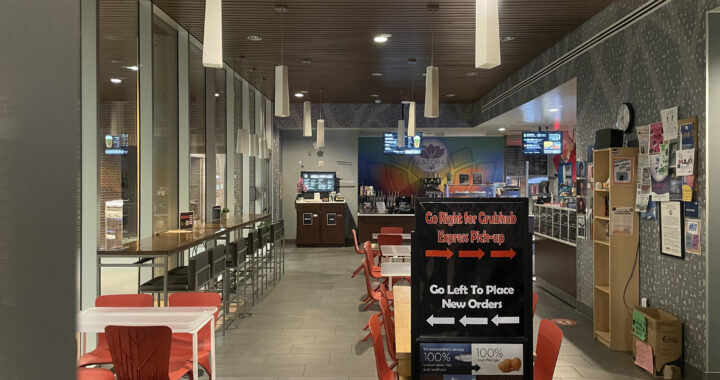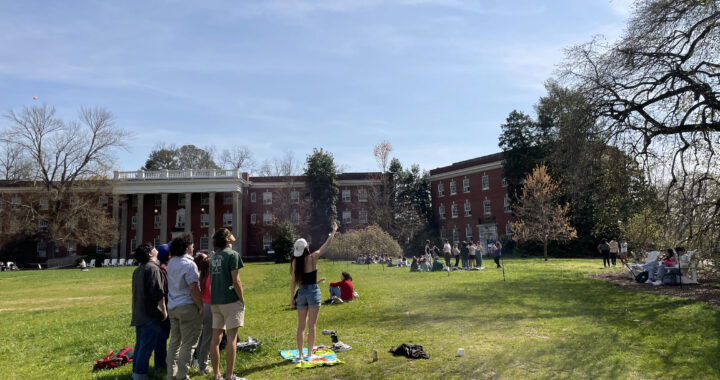Profile: Alaha Ahrar at UMW
5 min readBy VIRGINIA SCOTT
Freshman Alaha Ahrar believes that she represents a different Afghanistan; at 20 years old, she has high ambitions and is well on her way to achieving her goals.
William Crawley, Distinguished Professor of histoty for 40 years here at UMW, and his wife Theresa Crawley, are Ahrar’s US sponsors.
The Crawleys, after learning that UMW was partaking in an organization called Initiative to Educate Afghan Women have already been sponsors for two other students.
Theresa Crawley runs her own dentistry office on Fall Hill Avenue, here in Fredericksburg, and provides dental care for each young woman who comes to study.
Ahrar began studying English at an early age despite the incredulousness of her neighbors and friends. In fact, she is an advocate for the education of women in Afghanistan, where women very rarely get the chance to finish our version of high school let alone attend the few universities in the country.
By the time of an Afghan girl’s eighteenth birthday, many already have their marriage arranged and their lives planned for them.
Ahrar is one of the few given a chance to break the mold.
She is the daughter of a retired banker and a housewife. From a seemingly ordinary family, she arose with aspirations of being the first female president of Afghanistan.
Her English studies inspired her desire to one day go to the US to be educated. Ahrar got mixed reactions from neighbors and family friends; they either laughed at her in slight ridicule, attributing her dreams to the fact she was a child or praised her ambition and wished her the best.
However, Ahrar maintained her dreams of coming to US; when asked why she chose America, she replied, “Because I saw it as the top, the best.”
Despite Ahrar’s high hopes, then and now, she remains very loyal to her parents and always asks permission and their blessing on everything she does. Her parents may seem liberal to let their daughter travel abroad to further her education despite the danger she could be in for her progressive thinking. However, Ahrar described them as somewhat moderate amidst the society of Afghanistan.
Ahrar knew early on that in order to reach the level of education to which she aspired, she would be forced to travel outside her country. She explained that it is simply not safe for women to go to school, or even to travel to and from school.
It is, however, acceptable in Afghanistan for a woman to have a job, but safety is still an issue. Ahrar herself had a driver who chauffeured her to and from work.
The abundance of colleges and universities in Afghanistan is also staggeringly different from in the US.
The Kabul University of Afghanistan is the main public university that provides learning and higher education in fields similar, if not the same, as the ones Mary Washington offers. There is a recent, small growth in choices for higher learning, the American University of Afghanistan has now opened, but it is much more expensive to attend than Kabul University.
As aforementioned, Ahrar’s desire to travel to the U.S. for college was intense. At long last, her dream has been realized.
Ahrar’s journey to Fredericksburg began with a youth group out of Australia; she found them and intrigued them by sending articles she had written and interviews she had done. Going to Australia was her second choice; she also wanted to keep her options open in case something happened and she could not go to America.
Hamid Karzai, the president of Afghanistan, himself offered to send her to India to further her studies, yet she declined because she knew she would not make the mark she was striving for if she went to India.
The interviews Ahrar had done were through several different television stations, and they were usually based in Washington, D.C.
She interviewed over the phone with the VOA (Voice of Afghanistan) News and the National Television of Afghanistan. She was also featured in an issue of Red Cross magazine, The Red Cross Youth E-zine, in July 2008.
Despite all her experience speaking English, in order to come to a college in America she had to take an Internet-based test.
This test, the TOEFL (Test of English as a Foreign Language), was to affirm her ability to read, write, speak, and listen in English.
She graduated with honors from her school and the American Ambassador to Afghanistan found her admirable and her TOEFL score stated her mastery of English.
Ahrar will be studying at UMW for four years to complete a bachelor’s degree and is considering a double major in political science and international relations. Both majors are fitting for someone who wants to become the first female President of Afghanistan, or a leader in supporting women’s rights.
During the summers, she will return to Afghanistan, but during winter break, she stays in the US.
This past winter break, she went to Newburn, NC with some other girls on scholarships to the United States.
Paula Nischel, who is the founder of the Initiative to Educate Afghan Women, rented three buildings, right near the beach, for the girls to stay in while their respective schools were on break.
According to Ahrar, she hasn’t had too much trouble adjusting to life at UMW.
She said that she has been welcomed with open arms; her friends and professors have reached out to let her know that if she needs anything, just to ask.
However, Alaha’s host in the US isMartin A. Wilder, Jr. amd his family.
“They are too kind to me; whenever I feel lonely I find them around me and they often take me to restaurants for having lunch. The both always give me the love of parents and I love them both as much as I love my parents,” Alaha said.
Before leaving home, Ahrar previously had pictures in her head of what America would look like. But her expectations and reality didn’t match up exactly
She imagined tall buildings, somewhat like what would be found in New York City, that blocked the sun.
When she touched down on U.S. soil she quickly realized the sun was still visible.
When asked what she would like to change about America, or its citizens, she replied, “Respect… especially for the teachers.”
Ahrar would like to see students stand when the professor walks into the room for lecture; she doesn’t want anyone to take the “freedom of knowledge,” as she called it, for granted.
Ahrar also fiercely believes that traveling and seeing different cultures will make a more complete person; “We are all human, we are all the same, we all have the same feelings.”
Ahrar is aware of the type of stigma Afghanistan and its people have in America. She wants people to know and understand that the Afghan people are not poor; they are not beggars or criminals either.
Ahrar wants to be able to use the education and experiences she gains in the US to improve life and conditions in Afghanistan, which she still considers her home.
UMW’s participation in the program was intended to help Afghan girls, like Ahrar, to gain the skills and tools to work for and implement real change in their struggling country.











